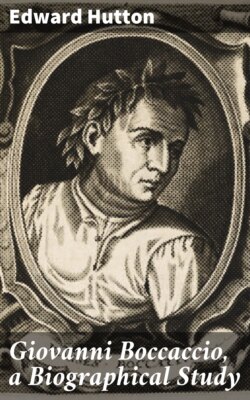Читать книгу Giovanni Boccaccio, a Biographical Study - Edward Hutton - Страница 5
На сайте Литреса книга снята с продажи.
CHAPTER I
ОглавлениеTable of Contents
1313–1323
BOCCACCIO'S PARENTAGE, BIRTH, AND CHILDHOOD
The facts concerning the life and work of Giovanni Boccaccio, though they have been traversed over and over again by modern students,[3] are still for the most part insecure and doubtful; while certain questions, of chronology especially, seem to be almost insoluble. To begin with, we are uncertain of the place of his birth and of the identity of his mother, of whom in his own person he never speaks. And though it is true that he calls himself "of Certaldo,"[4] a small town at that time in the Florentine contado where he had some property, and where indeed he came at last to die, we have reason to believe that it was not his birthplace. The opinion now most generally professed by Italian scholars is that he was born in Paris of a French mother; and, while we cannot assert this as a fact, very strong evidence, both from within and from without his work, can be brought to support it. It will be best, perhaps, to examine this evidence, whose corner-stone is his assertion to Petrarch that he was born in 1313,[5] as briefly as possible.
The family of Boccaccio[6] was originally from Certaldo in Valdelsa,[7] his father being the Florentine banker and money-changer Boccaccio di Chellino da Certaldo, commonly called Boccaccino.[8] We know very little about him, but we are always told that he was of very humble condition. That he was of humble birth seems certain, but his career, what we know of his career, would suggest that he was in a position of considerable importance. We know that in 1318 he was in business in Florence, the name of his firm being Simon Jannis Orlandini, Cante et Jacobus fratres et filii q. Ammannati et Boccaccinus Chelini de Certaldo. In the first half of 1324 he was among the aggiunti deputati of the Arte del Cambio for the election of the Consiglieri della Mercanzia;[9] in 1326 he was himself one of the five Consiglieri; in the latter part of 1327 he represented the Società de' Bardi in Naples, and was very well known to King Robert;[10] while in 1332 he was one of the Fattori for the same Società in Paris, a post at least equivalent to that of a director of a bank to-day. These were positions of importance, and could not have been held by a person of no account.
As a young man, in 1310, we know he was in business in Paris, for on May 12 in that year fifty-four Knights Templars were slaughtered there,[11] and this Boccaccio tells us his father saw.[12] That there was at that time a considerable Florentine business in France in spite of those years of disaster—Henry VII had just entered Italy—is certain. In 1311, indeed, we find the Florentines addressing a letter to the King of France,[13] lamenting that at such a moment His Majesty should have taken measures hurtful to the interests of their merchants, upon whom the prosperity of their city so largely depended.
Boccaccio di Chellino seems to have remained in Paris in business;[14] that he was still there in 1313 we know, for in that year, on March 11, Jacques de Molay, Master of the Templars, was executed, and Giovanni tells us that his father was present.[15] If, then, Boccaccio was speaking the truth when he told Petrarch he was born in 1313, he must have been conceived, and was almost certainly born, in Paris.
